
The U.S. Department of Justice (DOJ) and the U.S. Food and Drug Administration announced today the establishment of a federal multi-agency task force to combat the distribution and sale of illegal vaping products, including disposable e-cigarettes.
“Enforcement against illegal e-cigarettes is a multi-pronged issue that necessitates a multi-pronged response,” said Brian King, director of the FDA’s Center for Tobacco Products. “This ‘All Government’ approach – including the creation of this new Task Force – will bring the collective resources and experience of the federal government to bear on this pressing public health issue.”
Along with the FDA and DOJ, the task force will bring together multiple law enforcement partners, including the Bureau of Alcohol, Tobacco, Firearms and Explosives (ATF); the U.S. Marshals Service (USMS); the U.S. Postal Inspection Service (USPIS); and the Federal Trade Commission (FTC), to coordinate and streamline efforts to bring all available criminal and civil tools to bear against the illegal distribution and sale of e-cigarettes responsible for nicotine addiction among American youth. Additional agencies may join the task force in the coming weeks and months.
“Unauthorized e-cigarettes and vaping products continue to jeopardize the health of Americans – particularly children and adolescents – across the country,” said Acting Associate Attorney General Benjamin Mizer. “This interagency Task Force is dedicated to protecting Americans by combatting the unlawful sale and distribution of these products. And the establishment of this Task Force makes clear that vigorous enforcement of the tobacco laws is a government-wide priority.”
The federal task force will focus on several topics, including investigating and prosecuting new criminal, civil, seizure and forfeiture actions under the PACT Act; the Federal Food, Drug, and Cosmetic Act (FDCA), as amended by the Family Smoking Prevention and Tobacco Control Act (TCA); and other authorities.
“The U.S. Marshals Service Asset Forfeiture Division stands ready to work with our Task Force partners in the seizure of unauthorized e-cigarettes from domestic distributors seeking to sell them unlawfully,” said Ronald Davis, director of the U.S. Marshals Service.
According to a press release, violations of these statutes can result in felony convictions, significant criminal fines, and civil monetary penalties. They can also result in seizures of unauthorized products, which can help make illegal e-cigarettes less accessible, including to young people. Through their participation in the task force, USMS will help the FDA and the Department effectuate seizures of unauthorized e-cigarettes within the United States.
“The Justice Department is committed to enforcing the laws that prevent the sale and distribution of unlawful e-cigarettes,” said Principal Deputy Assistant Attorney General Brian Boynton, head of DOJ’s Civil Division. “We will work closely with our Task Force partners to address this crisis with all of the enforcement tools available to us.”
The Federal Trade Commission (FTC), which releases reports about cigarette, smokeless tobacco, and e-cigarette marketing and enforces various statutory and regulatory prohibitions on false and misleading advertising, will support the task force’s activities, including by sharing its knowledge about the marketplace for vaping products.
“We look forward to sharing our experience with this rapidly changing, multi-billion dollar market through this important Task Force,” said Samuel A.A. Levine, director of the FTC’s Bureau of Consumer Protection.


















